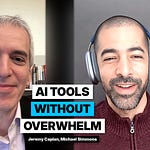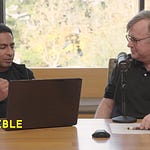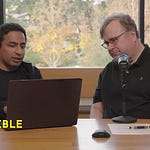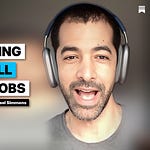Video Clip Source: Sy Bourgin’s Interview With Isaac Asimov (1975)
Author’s Note
What follows is chapter #2 of my Infinite Devotion book. Chapter #1 is Chess Champion Magnus Carlsen Challenges The 10,000-Hour Rule And Writes "New" Rules For Effortless Mastery.
In this chapter, we'll see how the same Achievement-by-Alignment principles that fueled Carlsen's chess mastery also illuminate the extraordinary output of one of history's most prolific writers and the creative success of one of America's most celebrated comedians. These case studies are in direct contradiction to the Achievement-by-Control paradigm that dominates our cultural understanding of success and productivity.
I will be releasing one chapter per week.
Paid subscribers will get special AI bonuses to make it easier to elegantly apply the book’s lessons in addition to exclusive access to $2,500+ in other bonuses (AI classes, templates, prompts, books).
CHAPTER 2: DECODING ISAAC ASIMOV’S “EFFORTLESS OUTPUT”
The productivity industry has sold you a fundamental lie: that extraordinary achievement requires extraordinary discipline.
What if I told you that many of the world's most prolific creators—from chess grandmasters to comedy legends to scientific geniuses—actually operate under a completely opposite paradigm?
One where difficult work feels effortless and where conventional productivity tools are not just unnecessary but actively harmful?
For example, consider this paradox…
Isaac Asimov published 500+ books, making him one of the most prolific writers in the history of human civilization. Not only that, he was considered one of the "Big Three" sci-fi authors of his era.
Yet, he did not set goals, make deadlines, time block, or study habit design.
This should not happen according to conventional wisdom.
If you watch the interview clip above, you would almost think he doesn’t really even have any system.
Every line of the interview is full of hidden meaning…
Interviewer: It seems like you’re in some sort of race.
Isaac Asimov: Well, I’m not. It seems so, but it isn’t so. Actually, what it amounts to is that I’m not happy except when I’m writing. It’s almost the only way I can think of to spend my time pleasantly. And so I’m naturally drawn to the typewriter at all times. The day is lost in which I don’t type.
Interviewer: Deadlines hold no terror for you?
Isaac Asimov: No, because I know that if I have an article to write, I can generally write it without trouble whenever I sit down.
Interviewer: It’s a book a month?Isaac Asimov: For the last four and a half years, it has been a book a month. It’s not something that I’ve set for myself as a goal. I just worked it back and said, “My goodness. It’s a book a month!
Though only 69 seconds long, this interview reveals something profound: a fundamental collision between two worldviews of achievement.
At every turn, the interviewer asks questions rooted in conventional wisdom, while Asimov gently redirects him. The interviewer can't comprehend:
How can anyone complete work without deadlines?
How can someone achieve something significant without goals?
How can anyone produce rapidly without racing against time?
These questions reveal our deep cultural assumptions about what drives achievement. We've been taught that productivity tools—deadlines, goals, habits, and time management systems—are essential because they provide:
Direction to prevent aimless wandering
Organization to avoid distraction
Energy to overcome laziness
Persistence to push through resistance
Without taming our human nature, conventional wisdom implicitly insists we would drift randomly, accomplishing little of significance.
Yet here stands Isaac Asimov. He doesn’t set deadlines. He doesn’t set writing goals. But he’s the most prolific author in history.
Yet, here stands Magnus Carlsen. He has never done chess homework. He has done significantly less deliberate practice than his peers. And he’s considered lazy. But he’s the top chess champion in history.
Both are living contradictions to everything we've been told.
What’s going on here?
Are Asimov and Carlsen just quirky individuals?
Or is there something deeper we can learn?
After spending the last 10 years experiencing and researching the Infinite Devotion paradigm, I can confidently say that Isaac Asimov and Magnus Carlsen aren't just weird anomalies. Rather, they represent the standard pattern of Infinite Devotion at work—a state where achievement emerges naturally from following what genuinely fascinates you rather than from discipline-driven control. Asimov's natural gravitational pull toward his typewriter mirrors what we saw with Carlsen's magnetic attraction to chess patterns.
But what happens when we look beyond solitary intellectual pursuits to a completely different domain—one that involves public performance, immediate feedback, and direct audience connection?
Enter Jerry Seinfeld and the world of standup comedy...
Jerry Seinfeld: The Work Is The Win
Source: Comedian Documentary (2002)
Here we see a fascinating interaction between Seinfeld and an aspiring, 29-year old comedian in the back of a comedy club. Here’s a core part of the back-and-forth:
Young comedian: I’m 29. I feel like I’ve sacrificed so much of my life. The last three years have been a blur.
Seinfeld [puzzled]: Do you have something else you would rather have been doing? You got other appointments or other places you gotta be?
Young comedian: Not necessarily, but I see all my friends are making a lot of money on Wall Street.
Seinfeld [scrunches his nose in confusion]: What?!?Young Comedian: I've seen that my friends are moving up and I'm worried.
Jerry Seinfeld [shocked]: They're moving up!?!? Are you out of your mind? This has nothing to do with your friends. This is a special thing. This has nothing to do with “making it” or...
Young comedian: Did you ever stop and compare your life and go, “Okay, I'm 29. My friends are all married, all having kids, they all have houses, they have some sort of sense of normality… What do you tell your parents? How do you deal with that?
Jerry Seinfeld [falling over laughing]: What do you tell your parents??!? Your parents???
At this point, Seinfeld can’t take it anymore. He plants his palm into his forehead with one hand and uses his other hand to steady himself.
After regaining his composure, Seinfeld tells a famous showbiz story.
In this story, the legendary Glenn Miller orchestra is forced to land in a field on a stormy, snowy, winter night. As a result, they now have to walk to the gig through the cold, wet, slushy snow with all of their heavy instruments. As they walk, they come across a little cabin, and they look in a window.
There, they see a picturesque scene of a family enjoying each other’s company—a husband and wife along with their two kids, warmed by a fire, sit around a table as they laugh, smile, and eat.
The performers take in the scene as they stand around in their suits. They’re wet and shivering while holding their instruments. Then one guy turns to another and confusedly says, “How do people live like that?”
Seinfeld then drives the point home…
“That’s what it’s about!”
This exchange reveals the profound gap between how Seinfeld understands his life and how the young comedian perceives it:
Key #1: "Did You Have Something Better to Do?": When 'Sacrifice' Becomes Irrelevant
What the young comedian frames as sacrifice ("I've sacrificed so much of my life"), Seinfeld views as the privilege of living exactly as he chooses. The documentary follows Seinfeld voluntarily returning to small comedy clubs to rebuild his standup skills after his TV success—struggling, bombing, and refining material night after night. Where others see hardship, he sees opportunity. This isn't sacrifice to Seinfeld; it's precisely the life he wants.
This points to a fundamental flaw in conventional wisdom.
Success gurus observe masters doing difficult things, then conclude that deliberately choosing difficulty must be the path to success. The logic flows like this:
Successful people work incredibly hard
Therefore, hard work must cause success
So we should embrace and glorify hardship
But this chain of reasoning misses a crucial insight: what transforms difficult work from depleting sacrifice into energizing engagement isn't the difficulty itself—it's the relationship to the activity.
Masters don't endure hardship to achieve success later. They transmute hardship through their devotion, turning what would break others into what builds them.
Key #2: "How Do People Live Like That?": Why The Devoted Actually Pity the Comfortable
The Glenn Miller orchestra story brilliantly illuminates this paradox. Those musicians, cold and wet, looking through the window at the "comfortable" family, don't envy them—they pity them. At the same time, they aren’t expressing a universal judgment—they're recognizing a profound difference in what brings meaning to different lives.
"How do people live like that?" captures the essence of Infinite Devotion: each person finds fulfillment through their unique relationship with what matters to them. Seinfeld would rather bomb on stage pursuing comedy than succeed at anything else.
This redefines what constitutes "hard work." In the Infinite Devotion paradigm, true difficulty isn't found in long hours or challenging problems—it's found in disconnection from what naturally engages you. What conventional wisdom labels as "work" becomes play when aligned with your authentic interests, while "easy" tasks become unbearable when they require you to suppress what truly matters to you. The devoted aren't running from effort; they're running toward meaning.
Key #3: "What?!": Seinfeld's Shock Reveals How Irrelevant Others' Success Becomes
The conventional achievement paradigm insists that we measure our progress against others. We're taught to benchmark our careers against our peers, our salaries against industry averages, our life milestones against social timelines. This comparative framework creates a perpetual arms race where "enough" is always just beyond reach—because someone else has more, has gone further, has achieved faster. It's a system designed to create permanent dissatisfaction while propelling us forward through fear of falling behind.
Seinfeld's bewildered reaction to concerns about friends "moving up" on Wall Street and his explosive laughter at "What do you tell your parents?" reveals how thoroughly he's rejected external metrics of success. His incredulity shows he's operating from an entirely different value system—one where comparisons to peers or seeking parental approval are as irrelevant as comparing his comedy to underwater basket weaving.
Key #4: You've Already "Made It": The Paradigm Shift That Changes Everything
While the young comedian anxiously measures himself against external markers of success—friends' salaries, parental approval, conventional life milestones—Seinfeld has constructed his reality around internal standards:
His focus isn't on achievement but on immersion in the craft itself.
His timeline isn't structured around future rewards but present engagement.
His validation comes not from others' opinions but from his relationship with comedy.
The transformative insight here is that "making it" isn't some future state to be reached through current misery. In Seinfeld's paradigm, you've already "made it" when you get to devote yourself to what fascinates you. The acclaim, money, and recognition are merely byproducts of this devotion—not the purpose of it.
This is why Seinfeld can't even comprehend the young comedian's framework. They're not just speaking different languages—they're living in entirely different realities.
And here lies the revelation at the heart of this book: What we're witnessing in these exchanges isn't stylistic differences. It's evidence of a fundamental pattern that challenges everything we think we know about achievement.
Three Masters, One Revolutionary Paradigm
When we combine the insights of Carlsen, Asimov, and Seinfeld, we see that they’re all quirky, but surprisingly, they’re quirky in the same way. This commonality reveals a striking pattern:
What’s interesting here is that these paradigms aren’t just different; they’re diametrically opposed. It's a complete inversion of how we understand achievement itself. The conventional approach treats resistance as something to overcome through discipline. The Infinite Devotion approach treats resistance as valuable information about alignment.
This explains why so many high-achievers feel simultaneously successful and miserable: they've mastered the mechanics of the conventional paradigm while missing the essence of what makes masters like Carlsen, Asimov, and Seinfeld not just accomplished, but fulfilled.
The implications are profound.
What if the very systems we've designed to help us achieve—goal-setting frameworks, productivity systems, habit trackers—are actually impediments to the deepest forms of achievement?
What if, in our obsession with systematizing success, we've sanitized the very chaos from which genius emerges—like trying to grow a forest by planting plastic trees?
To understand just how profound this paradigm shift is, we need to examine the fundamental causality models underlying each approach…
The Great Reversal: How Infinite Devotion Flips The Process Achievement on Its Head
The conventional Finite Discipline paradigm follows a linear, sequential chain:
Goal Setting → Strategy → Time Mgmt → Disciplined Execution → Achievement
Or shown visually:
This causal sequence begins with identifying desirable external outcomes.
Then you reverse-engineer with a strategy—a blueprint for turning aspirations into accomplishments.
Next, time management tools and discipline help you execute this strategy despite resistance, boredom, or competing priorities.
Success arrives only after you've pushed through all the necessary steps before your deadline, often years later.
Infinite Devotion doesn't just modify this sequence—it fundamentally reverses it:
Fascination → Engagement → Direction → Immersive Practice → Mastery → Achievement
Or shown visually:

This inverted causality begins with what naturally pulls your attention and energy in the present moment. Instead of starting with what you should want, you begin with what genuinely fascinates you now—what you can't help thinking about even when no one's watching.
This intrinsic fascination naturally generates sustained engagement that doesn't require external pressure. As Carlsen demonstrated when he couldn't stop thinking about chess even in casual settings, and as Asimov revealed when he said "I'm not happy except when I'm writing," this engagement isn't forced—it's the default state that requires effort to interrupt, not maintain.
The sustained engagement leads to immersive practice that accumulates faster than deliberate practice because it doesn't deplete your psychological resources. Achievement emerges as the natural byproduct of this process rather than its explicit target.
The implications of this reversal are profound:
Achievement becomes easier because you're flowing with your intrinsic interests rather than fighting against resistance
Practice accumulates faster because engagement doesn't drain willpower
Innovation emerges naturally because you explore domains out of genuine curiosity rather than obligation
Distinctive contributions become likely because you follow unique combinations of interests rather than conventional paths
Persistence through difficulty increases because the activity itself provides immediate meaning beyond delayed external rewards
This reversal explains why so many successful people report feeling like they "never worked a day in their life" despite putting in thousands of hours that would feel excruciating to someone pursuing the same field without intrinsic fascination.
Most importantly, this reversal radically simplifies the achievement equation.
Rather than requiring perfection in multiple areas:
Finding the optimal goal-setting framework
Implementing the perfect time management system
Developing ironclad discipline
Creating the ideal accountability structure
Balancing work and recovery
Infinite Devotion allows a single focus: identifying and following what naturally pulls your engagement. The rest—hard work, distinctive contributions, persistence—emerges organically from this alignment.
This doesn't mean excellence comes overnight or without effort. Masters like Carlsen, Asimov, and Seinfeld all put in thousands of hours developing their craft. The difference is that their effort emerges from alignment rather than enforcement.
Nor does this mean there's no place for goals or structure. Tools from the conventional paradigm can serve the Infinite Devotion approach—but as servants rather than masters. The problem occurs when goal-setting becomes the primary operating system for achievement rather than a support.
The fundamental insight is this: When you reverse the causal sequence, you transform achievement from something you must force yourself to pursue into something that naturally unfolds from who you already are.
The Invitation To A Different Reality:
The Carlsen, Asimov, and Seinfeld case studies offer us a glimpse into achievement's hidden physics—principles that operate beneath the surface of conventional wisdom yet produce extraordinary results.
Productivity struggles aren't a willpower problem but an alignment problem.
This revelation raises profound questions that shake the very foundation of our cultural understanding of success:
What if our struggles with procrastination and burnout aren't signs of personal failure but evidence that we're operating within a flawed paradigm?
What if your productivity struggles aren't a willpower problem but an alignment problem?
What if the most valuable forms of productivity can't be scheduled, tracked, or forced through discipline?
What if the techniques we've been taught to overcome resistance are actually preventing us from discovering our most natural and powerful sources of motivation?
These questions cut to the heart of our daily experience of work, creativity, and meaning. They challenge us to reconsider everything we've been taught about what drives human excellence.
But here's where the invitation becomes both thrilling and terrifying: If the conventional wisdom about achievement is fundamentally flawed, then a vast new territory of possibility opens before us—one where extraordinary accomplishment might emerge not from discipline and sacrifice but from alignment and engagement.
The journey into this territory requires courage. It means questioning deeply held assumptions about success that have been reinforced by every institution in our society, from school to work to culture overall. It means experimenting with approaches that might look irresponsible or indulgent to others. It means trusting internal signals of engagement over external metrics of productivity. It means understanding that the path of devotion unfolds on its own timeline—often meandering, sometimes doubling back, but ultimately leading to contributions that are far better than you could’ve planned in advance.
For those willing to make this journey, the rewards extend far beyond just greater achievement. They include the reclamation of joy in work, the discovery of untapped reserves of creative energy, and the profound satisfaction of making contributions that emerge naturally from who you are rather than what you think you should be.
As we move forward, we'll explore both why the conventional achievement paradigm so consistently fails us and how to navigate the uncharted territory of this alternative approach. We'll see why techniques that work brilliantly for some people fail miserably for others. And most importantly, we'll develop practical strategies for finding your own path of least resistance to extraordinary achievement.
What Paid Subscribers Get
In the coming weeks and months, the following resources will be released with the book:
Interaction. Get access to the comments so you can ask questions.
Full PDF of the book with prompt. The PDF allows you to upload it to AI so you can chat with it. The prompt helps you get the most from the book.
Behind-the-scenes stats. Whether the launch is a success or a failure, I will share behind the scenes stats on the results of each email (upgrades to paid). I will share this publicly so other thought leaders can learn from my experiment of releasing a chapter via a book.
The Complete Infinite Devotion Manual — Get my full 34,000+ word comprehensive guide including all examples, case studies, and in-depth explorations of how to implement this paradigm in your life.
Detailed Bibliography with 50+ Categorized Sources — Access a meticulously organized collection of academic research with explanatory paragraphs connecting each source to the Infinite Devotion framework.
Practical Implementation Guide — Learn step-by-step approaches for transitioning from discipline-driven to devotion-driven work, with specific strategies to transform not just your productivity, but your entire experience of life. Learn how to handle necessary but unenjoyable components of mastery and work while staying in the Infinite Devotion framework.
The Infinite Devotion Assessment — Take a comprehensive self-evaluation to determine where you currently fall on the spectrum between Finite Discipline and Infinite Devotion, with personalized insights for your journey.
The Infinite Devotion Planning Framework — Access a complete system for setting direction, making decisions, and creating achievements while maintaining intrinsic motivation and avoiding burnout.
Stepping Stone Mastery Manual — Master the art of following emergent opportunities and navigating your career through curiosity rather than rigid planning.
Infinite Devotion Class — Deepen your understanding through structured learning materials that break down the concepts into applicable wisdom.
$2,500+ in other bonuses (classes, templates, prompts, books)
All these premium materials are available for just $20/month or $100/year — a small investment to transform your relationship with work, creativity, and achievement.












